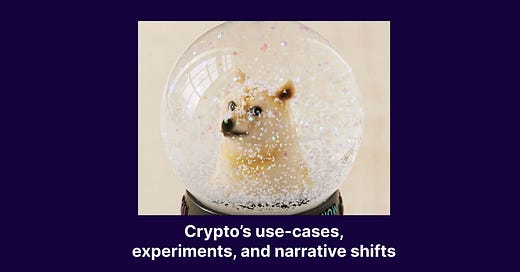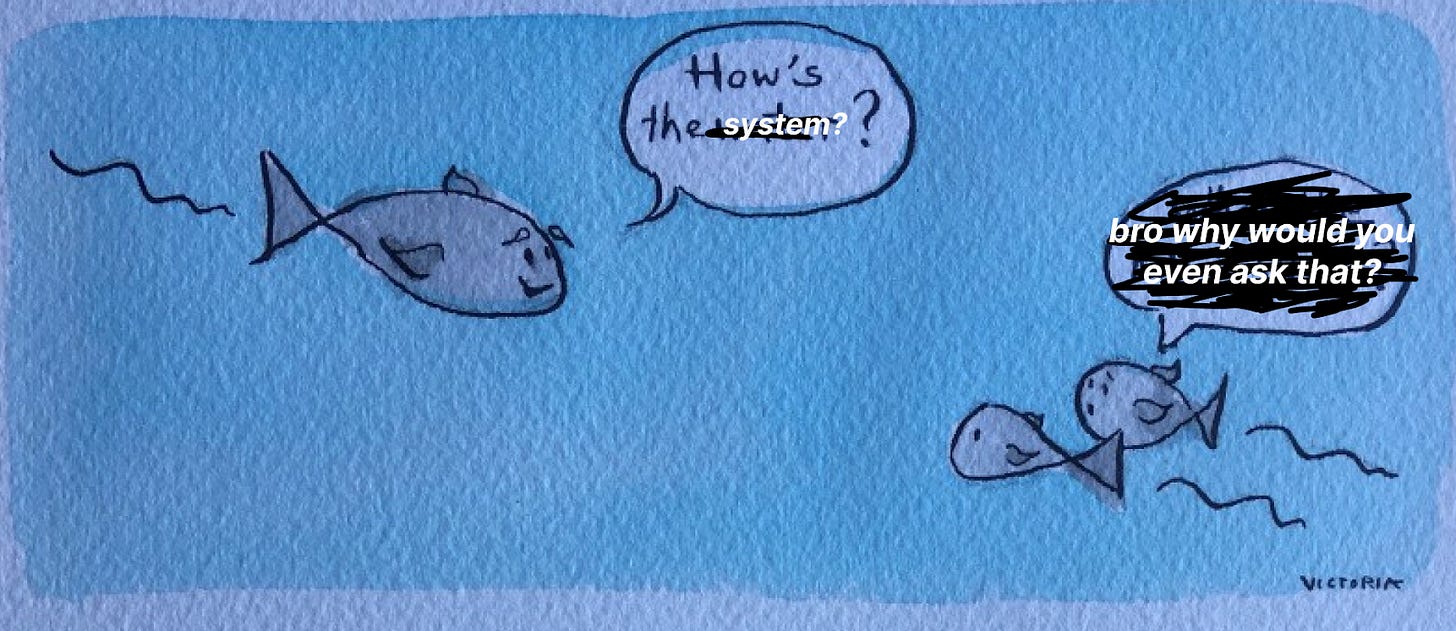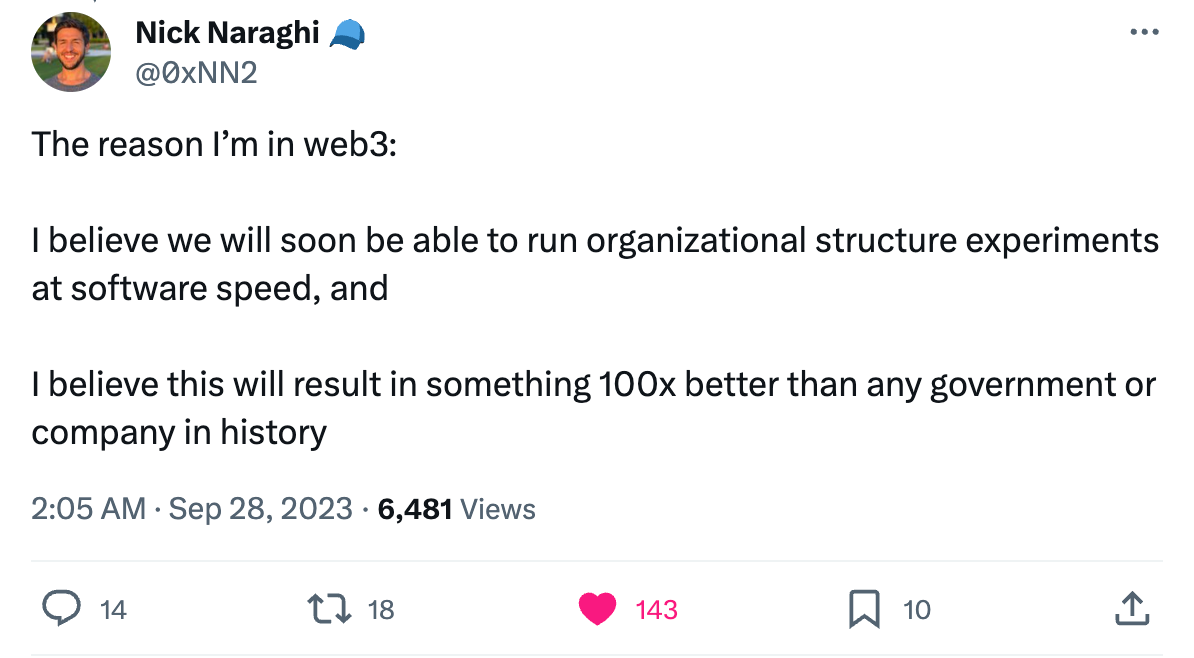Conversations with non-crypto friends about the space inevitably trundle into the ‘checkmate’ question: “But like, what actual use cases does crypto have?”
We’ve made a lot of progress across the space, but I understand the skepticism. At a high level, though, there are two main things I try to communicate:
When people say crypto lacks a use case, they usually mean that it appears to lack a use case for the typical Western consumer with disposable income. For those of us born elsewhere (I lived my early years in post-Soviet Siberia), we know inherently why it is so revolutionary and so necessary. Blockchains enable a system of governance and finance that is separate from centralized state structures, acting as a bulwark against potential misuse of power. Crypto’s existence is its main use case.
Crypto is exciting because it offers a perfect testing ground and toolkit for experimenting with entirely new systems of economics and governance. In doing so, it opens up these fields to the powerful forces of evolutionary innovation, which will lead to much better systems in those fields. The sudden emergence of this real-world laboratory has also shifted old narratives, shaking up the confined snowglobe of our political and economic thinking and turning previously frozen topics into fresh areas of discussion. These fields are now practical instead of theoretical, allowing us to experiment and think outside of the sphere.
We now have a brief window in time where new ideas and actual change seem feasible. And it’s good timing because we certainly need alternatives.
The water we swim in
Our collective political and socioeconomic thinking is stuck. There are plenty of interesting ideas, but they are relegated to endless debate in academia, never tested in the daylight of real incentives and irrational actors. This makes sense; novel ideas of these kinds are very expensive to test in the real world. The current system also perpetuates itself by creating an information environment where alternatives are not taken seriously. We are taught that history ended in the early 90s, and all important problems have been solved. It is clearer now than ever, amid a carnival of simultaneous crises, that this is not the case.
Solutions to these crises will be multidisciplinary, and they will certainly require new systems of governance, coordination, and economics. We’re used to seeing attempts to change these things through mass protests and top-down revolutions, but these rarely achieve their goals, often replacing one form of inequity with another.
Instead, we should focus on a decentralized ground-up approach: running countless concurrent experiments in governance, community-building, and economic models. These experiments could range from pilot programs within existing communities to entirely decentralized autonomous organizations. By adopting an iterative approach, we can learn from each trial, making real-time adjustments as needed. This methodology respects the complexities of societal change and offers a safer, more sustainable path toward improvement.
There are many sources of inspiration. New anthropological and archaeological research in books like The Dawn of Everything shows that the history of our species is full of diverse political and social structures and that humans 10,000 years ago were likely more engaged in the politics that ruled their lives compared to today’s average person. They outline clever and interesting frameworks, like indigenous North American societies that lived under centralized rule in winter months and reverted back to decentralized communities in other seasons. These may or may not be relevant to our coordination systems today, but they are important reminders that it is possible to be more creative. We have to continuously question the political water we swim in.
It’s time to experiment
Crypto enables us to explore these ideas, and many others, by creating a versatile toolkit for societal experimentation. We can trial different systems of property rights, currency, power, and identity, designing systems with real incentives to see how people act and react.
This is important because it suddenly allows us to tap into the strongest force of innovation: evolution. In Matt Ridley's books 'Genome' and 'How Innovation Works,' he explores two very different fields (nature and technology) but comes to the same conclusion: the most effective solutions arise from a process of continuous evolutionary trial and error. This is how complex life has evolved and how the best technological innovations are created.
Crypto's new primitives—smart contracts, programmable money, NFTs, and others—bring this iterative, evolutionary mechanism to the realms of governance and economics. And because crypto is by default open-source and composable, every trial and error is transparent for everyone to see, allowing for an even faster collective learning process that supercharges the pace of innovation.
To summarize the key idea: crypto subjects the fields of governance and economics to the powerful forces of evolution. We can now experiment with social structures in the same way as we create new technology: ideate, launch MVPs, test, and iterate.
The result of this will be “something 100x better than any government or company in history”.
You no longer need to run a country to form a new currency or create a new system of voting. Do it digitally in a DAO, or start a network state, or start your own decentralized social network governed by its users. This experimentation is happening across the entire space, from infrastructure to DeFi to consumer tech to DAOs. I’m excited about all of it, but I’m following these areas most closely:
Consumer crypto leverages the tools of the space to create compelling product experiences for users.
Games and autonomous worlds allow us to create entirely new experimental worlds and economies.
DAOs and online communities show us how large groups of strangers can coordinate and share resources.
Cooperatives, localized currency experiments, and digiphysical goods are bringing blockchain into the IRL.
Decentralized venture DAOs are perfect experimentation environments because they have relatively simple decisions with high stakes, allowing many different structures to be tried.
These examples might seem relatively trivial compared to the grand rhetoric of societal change. But real sustainable change will have to come from the ground up. We will prove and test new ideas in increasingly higher-stakes environments, earning the right to challenge long-standing institutions and paradigms.
Interestingly, and perhaps just as importantly, the novelty of the technology and the way that it influences these fields has led to a powerful shift in our perception of political ideas, both new and old.
Narrative shifts
‘Web3’ has shifted discourse significantly. It is now common to hear tech bros talking about ideas like ‘shared ownership’ and ‘polycentric governance.’ Huge VC funds have been raised on the thesis that the people who create value in platforms should own those platforms and have part of the upside. This is called socialism the Ownership Economy, and it is a good idea.
A couple of short generations ago, discussing this in the US would have you ostracized or put in jail. The Overton window has shifted; these topics are now common not only because web3 technology makes them more possible, but also because the arrival of new technology shakes everything up, giving old ideas new names and making them sexy. One of the most impactful things web3 has done is to make smart tech people interested in politics again.
Nathan Schneider describes this ‘innovation amnesia’ and why it is healthy in an excellent post:
The class of technology variously referred to as Web3 or crypto has been heralded as a democratizing force for economics and governance. To the extent such hype is justified, it is only partly due to the affordances of the technology itself. Perhaps more important is the amnesia it has induced, as an innovative paradigm whose novelty inclines people to neglect once-stable norms.
Big epochal shifts in technology create opportunities to question and redefine the systems that we live in. They unlock new capabilities, allowing us to question our prior-held assumptions. The last major technological shift, the introduction of the internet, led to interesting attempts to establish new norms like the Declaration of Independence (of Cyberspace). But structurally, little changed, and the existing system captured the web. Large shifts enable change but don’t guarantee it.
Will this time be different? Maybe. Some reasons why it might:
We are much more aware of the crises we face. Climate, mental health, inequality, and many others are an ever-present part of mainstream discourse. When even Ray Dalio says that the system needs to change, you know there has been a major shift in public thinking.
We’re living through multiple major technological accelerations, driven in part by AI, and the stakes are higher than ever. The magiclike power of the technology and the accompanying sense of awe and fear has created a mainstream understanding that we really need to get this transition right. Important questions like “how will we govern the AI models that run our societies?” are starting to be discussed.
Crypto is a subversive ground-up technology and industry, making it harder to capture. It has been explicitly political from the start, requiring earnest participants to understand the values of decentralization before coming on board. This was not the case with the web, where the politics were implicit, and people were not aware it could be coopted until it was too late. In crypto, big tech can’t centralize the data and monetize it as easily as the internet, yet. This provides a window to engineer new systems grounded in the values of the space.
However, as Schneider describes in his post, the possibility of positive change does not mean that it will happen. In fact, it seems that thus far, the space has not lived up to the promises described above at all. The scams, frauds, and unethical practices have painted it in a bad light. The only way to show that there is value here is by proving it; these are issues that our community needs to confront head-on.
The only way to be sure of a better future is to create it.
Seize the juncture, shape the future
We stand at a unique juncture, a window of opportunity opened by technological acceleration and pressing global issues. Crypto has given us a fresh canvas for social and economic experimentation, but this window won't stay open indefinitely.
As we've seen in history, complacency and inaction can quickly close the door to change. Just because crypto enables evolution, it doesn’t mean it’s inevitable. It's not just about adopting new technology but about mobilizing a broad swath of society to actively engage in the governance of our shared future. We have the tools; now, we need the collective will. Let's not squander this chance to reimagine and reshape our world.
Thank you, Ori Shimony and Arthaud for thoughts and feedback. For more, subscribe here or follow me on Twitter.






